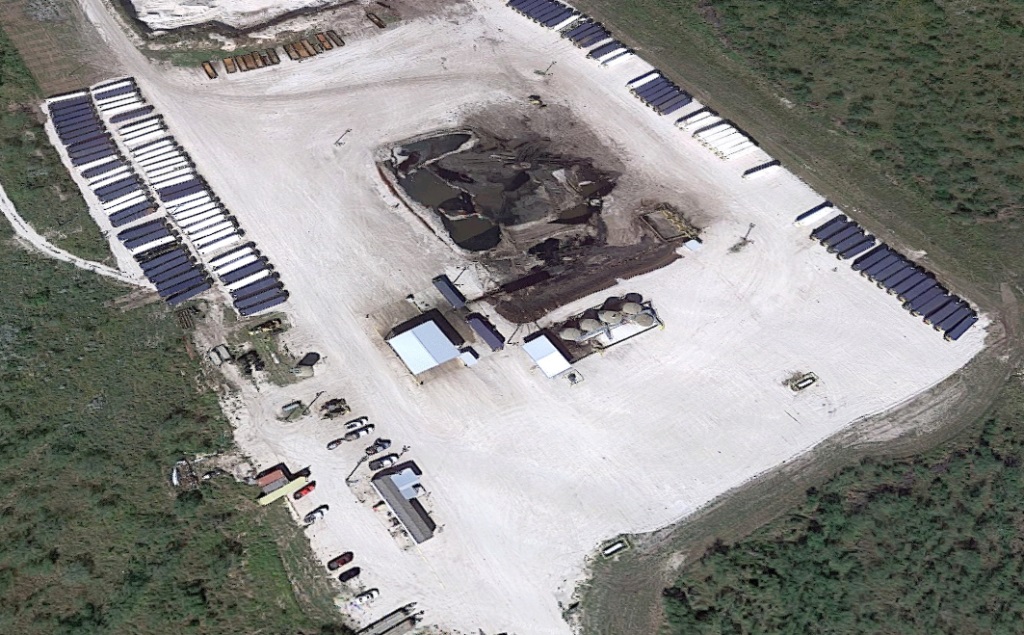While the draft rule introduces more stringent regulations compared to the previous framework, it still lags behind standards set by other states for managing drilling waste.
For instance, North Dakota only allows open pits for liquid waste—such as drilling mud and produced water—under special circumstances with regulatory approval. In 2008, New Mexico implemented updates to its waste rules, banning the use of unlined pits altogether.
Virginia Palacios, now the executive director of Commission Shift, has firsthand experience with the impacts of oilfield waste from the shale boom in her hometown of Laredo.
Speaking at the Texas Groundwater Summit in San Antonio this August, she recalled seeing open-top trucks spilling drilling waste onto roads and an oily sheen covering a pit at her family’s ranch, despite assurances from the company that it contained only water.
In Texas, most landowners do not own the mineral rights beneath their land. Oil and gas companies that hold those rights often negotiate surface-use agreements with landowners, which may include provisions for waste pits.
Palacios emphasized that better regulations are needed across the board to protect groundwater, rather than relying on individual mineral owners to secure favorable lease terms.
“We can’t depend on mineral owners to always negotiate the best terms,” Palacios said during the summit. “We need strong, consistent regulations to ensure groundwater protection everywhere.”
One of her main concerns with the draft rule is that it doesn’t require operators to notify landowners before digging authorized pits on their property.
Palacios argued, “Landowners deserve to know what’s happening on their land so they can give informed input.”
In some areas, like a commercial waste facility on the outskirts of Odessa, residential neighborhoods are situated near oilfield waste sites. Advocates have been pushing for better notification processes when companies apply for permits to open such facilities, as proximity can lead to significant environmental impacts.
Poorly constructed pits or those that leak can pose serious threats to groundwater. According to the Railroad Commission’s online database, 712 violations related to water contamination have been issued since 2015.
However, the commission hasn’t clarified how many of these violations occurred specifically at waste pits. The commission’s groundwater protection report lists six active cases of groundwater contamination caused by waste pits, with an additional case linked to a commercial waste facility.
Concerns about the adequacy of the draft rule aren’t limited to nonprofit groups. Gabriel Rio, CEO of Milestone Environmental Services, a waste management firm, told that the current draft falls short of adequately safeguarding groundwater. He commented, “What’s proposed doesn’t even match what the industry is already doing.”
Though Milestone Environmental Services declined to provide further comments, Rio’s stance highlights that some in the industry also believe the draft doesn’t go far enough in addressing environmental concerns.
Jim Wright, who won a seat on the Railroad Commission in 2020 after a career in oilfield waste management, made updating waste regulations a key priority. His staff established a regulatory task force that provided initial recommendations for revising the rules.
Palacios voiced concerns about the industry’s role in shaping early versions of the rule, suggesting that waste management companies may have had undue influence through private meetings with regulators before the draft was shared with the public.

In response, Aaron Krejci, a spokesperson for Commissioner Wright, said, “It’s difficult to see how industry could have undue influence when the alternative is doing nothing, keeping the old rule, and maintaining the status quo.”
During the informal comment period, several waste management professionals expressed support for more protective measures. Landowners and residents also submitted comments backing the new regulations.
However, many oil and gas operators pushed back on stricter rules for reserve pits. The Texas Alliance of Energy Producers, for instance, lobbied for exceptions to liner and groundwater monitoring requirements for reserve pits that are open for less than 18 months before the waste is buried.
Karr Ingham, president of the Alliance, said his organization had additional meetings with Railroad Commission staff and commissioners following the informal comment period. According to Ingham, these meetings allow the industry to provide valuable information that agency staff may not have.
“They’re willing to meet with us and listen. This is not unusual,” Ingham explained.
The latest draft of the rule includes a provision allowing operators to request exemptions from certain requirements for reserve pits.
Judy Stark, president of the Panhandle Producers & Royalty Owners Association, said a “one-size-fits-all” approach to the rules wouldn’t work for her region. She expressed concern that requiring landowners to be notified of pit locations could cause costly delays for drilling operations.
“If someone is on vacation, you can’t afford to wait, especially with a rig costing $100,000 a day,” Stark explained.
Stark believes the draft rule represents a sensible approach but acknowledged that it’s still in the drafting stage, and its final version is uncertain.
Not everyone involved in the rulemaking process feels their concerns have been adequately addressed. Tara Jones, who lives near the Blackhorn Environmental Services waste facility in Orange Grove, Texas, has struggled with strong odors from the facility seeping into her home.
She sought help from the Texas Commission on Environmental Quality, which oversees air emissions from stationary facilities, as well as from the Railroad Commission and her elected officials. However, Jones feels that waste facilities affect residents far beyond their immediate boundaries.
“I’m a mile away with only one property owner between us, but when it comes to air quality, distance doesn’t really matter,” Jones said.
She remains skeptical about whether the Railroad Commission seriously considers public comments.
“I think if you’re loud enough, sometimes they listen. But does it really change their decisions? I doubt it,” she said.
When asked how the commission engages with landowners and nearby residents of waste facilities, a spokesperson said the agency uses “various sources of information and expertise,” including public comments. They added that staff would review and incorporate public input as appropriate.
Palacios emphasized that the proposed changes represent a significant overhaul of groundwater protection rules and urged the Railroad Commission to extend the public comment period for the draft, which exceeds 300 pages.
“This is a massive overhaul of vital groundwater protection regulations,” she said. “We need at least a 90-day comment period to ensure meaningful public participation.”
Asked if the Railroad Commission plans to extend the comment period or hold hearings outside of Austin, the agency spokesperson said that people from other regions can participate in the virtual hearing.

